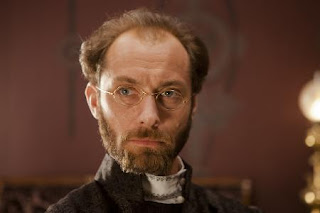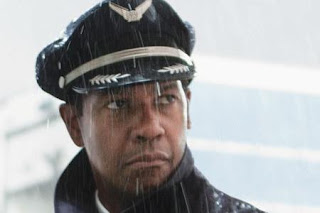Ten years ago, if you heard that Jude Law was starring in a version of Anna Karenina, would you ever guess that he was playing Karenin rather than Vronsky? Or that he could do it so believably? As the by-the-books cuckold to Keira Knightley’s unfulfilled, outcast heroine, Law hits all the right notes and brings facets to the character that have often been absent in previous screen interpretations of the character. Not only is the performance free of vanity, but Law also manages to make Karenin a sympathetic character whose own moral crisis is deeply felt and compelling. Knightley and Aaron Taylor-Johnson have the flashier roles, but Law is the standout of the cast, providing the moral backbone against which the sordid tale plays out.
Sam Rockwell has spent the last decade as one of Hollywood’s most unsung and dependable character actors. His delightfully demented turn in Seven Psycopaths is another entry in his growing list of dynamic, scene stealing performances. As the dog kidnapping, serial murdering, aspiring co-screenwriter, he walks that very fine line between taking a character seriously and surrendering to the sheer ridiculousness of the story’s premise. What Rockwell does here is more difficult than it may at first appear. Look closely at his character at the beginning of the film and his character at the end, and consider that he makes that transition without it ever seeming jarring, that he gradually brings Billy Bickle right over the top and then just keeps going in a transcendently crazy and entertaining performance.
I went into Les Miserables expecting little from Eddie Redmayne, both because he did so little for me in My Week with Marilyn and because Marius is such a drip of a character. Imagine my surprise, then, when Redmayne’s performance proved to be one of the most moving in the picture. In his hands Marius is not the empty romantic figure, but one of flesh and blood who has a solid sense of purpose and exists as more than just the centre of a limp triangle. In his rendition of “Empty Chairs At Empty Tables,” when he laments the many friends lost in the failed revolution, he strikes a resonant chord that anchors the character to something very real. It’s a skilled performance that does for the film’s final act what Anne Hathaway’s much more celebrated performance does for the first.
John Hawkes holds the distinction (of which I am sure he is very proud) of being the only actor to appear in every year end “best performance” list I’ve done. His performance in The Sessions is the polar opposite of those previous, villainous performances, playing a gentle soul who wants, quite simply, the fullness of the human experience. Playing a man confined much of the time to an iron lung, Hawkes’ has limited mobility but his ability to express the longing and loneliness that his character feels is never hindered. Hawkes’ moving and engaging performance is the heart and soul of The Sessions, going beyond the very particular circumstances of one man to touch at what is universal amongst human beings: the desire to love and be loved.
Christoph Waltz was made to recite Quentin Tarantino dialogue. In Django Unchained, as in Inglorious Basterds before, he finds that perfect balance between investing in the character and taking things seriously, and having fun with it. But while Waltz finds the perfect, often light, tone for the dialogue, he also brings depth to the role of the dentist turned bounty hunter, expertly guiding the character from casual indifference to slavery to abject horror. There is not a single moment in this performance that feels false. From his jaunty introduction to that moment when he realizes that he would rather die than not kill Calvin Candie, Waltz is pitch perfect from beginning to end.
“I am a writer, a doctor, a nuclear physicist and a theoretical philosopher. But above all, I am a man.” Lancaster Dodd is everything and nothing, a charlatan who promises enlightenment but who has not even mastered himself, let alone anything else. Philip Seymour Hoffman infuses him with all the necessary charisma and confidence, but Dodd only seems indomitable – behind the scenes, and away from the loving looks of his supporters, he is a man full of self-doubt and weakness. The character is fascinating and Hoffman plays him for all he’s worth, leaving no stone unturned and delivering a portrait of both the man, and the legend that he wants to become.
Denzel Washington’s Whip Whitaker is a functioning alcoholic until suddenly he isn’t and he’s forced to confront his many demons. Washington plays Whip with bravado and defiance, using his incredible skill as a pilot as a shield against criticism. But as the blows continue to rain down, the facade begins to break apart, revealing the incredibly vulnerable and broken man behind it. There is fear in those eyes; there is pain and guilt and loneliness. Washington delivers a multi-layered performance that brings every shade of Whip to light, going to the darkest, ugliest depths of addiction and finally reaching bottom and coming back up for air. It is one of the best and most nuanced performances of Washington’s career.
As the flamboyant (and often hilarious) abolitionist Congressman Thaddeus Stevens, Tommy Lee Jones delivers a masterful and very entertaining performance. As played by Jones, Stevens is a man of staunch principle who is never afraid to say exactly what he thinks and has no patience for playing politics on a matter as fundamental as human dignity and abolishing slavery. When he’s presented with the task of biting his tongue and playing along with the party line in order to assure that the 13th Amendment is passed, it isn’t just a matter of finesse, it’s a painful moral compromise that obviously weighs on him. Jones makes the audience feel and understand his character’s moral struggle, subtly suggesting his discomfort with what he’s doing without letting him seem broken by it. This is a triumphant performance that nicely counterpoints that of Daniel Day-Lewis, and helps make Lincoln such a wonderful film.
Daniel Day-Lewis is never an actor to do things by half measures. His performance as Abraham Lincoln is fully realized, engaging with the legendary aspects of the 16th President, but never letting them overshadow the human side of the man. While Day-Lewis has the opportunity to make several grand speeches during the course of the film, it’s the quieter moments in the performance that stick with you. It’s the way he tenderly curls up next to a sleeping Tad Lincoln on the floor, the casual, shrugging way that he ends a public speech with “that’s my speech,” the deft mix of seriousness and gentle humour, and his assured, pensive attitude in scene after scene – demonstrating why the man was such an effective leader for such a volatile time – that makes the performance so memorable. Day-Lewis will win his third Oscar for his work here and, while it isn’t my absolute favorite performance of the year, it will be well-deserved.
As The Master’s Freddie Quell, Joaquin Phoenix is a force of nature, delivering a volcanic performance that practically quakes the film off the screen. As the perpetual outsider, seemingly alienated from absolutely everything around him, the rage, confusion, and pain of his face often sets the tone of a scene. The exhilarating jailhouse breakdown might be seen as unbridled, but the notion that Phoenix’s performance is lacking in discipline is belied by the processing scene, in which he’s forced to shift gears, gracefully guiding Freddie from obnoxious jokester to totally hooked devotee in a manner of seconds. This is a full blooded, completely committed performance, pitched at a level of intensity that few other actors would be able to maintain over two and a half hours. Hands down, this is the best performance of the year.










1 comment:
Refreshing to see someone give Phoenix some much deserved credit for an outstanding performance.
Post a Comment